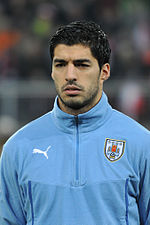| Portal | Participants | Templates | Tasks | Assessment | Popular Pages | Requests |
The Uruguay Portal
Uruguay (/ˈjʊərəɡwaɪ/ YOOR-ə-gwy, Spanish: [uɾuˈɣwaj] ), officially the Oriental Republic of Uruguay (Spanish: República Oriental del Uruguay), is a country in South America. It shares borders with Argentina to its west and southwest and Brazil to its north and northeast, while bordering the Río de la Plata to the south and the Atlantic Ocean to the southeast. It is part of the Southern Cone region of South America. Uruguay covers an area of approximately 176,215 square kilometres (68,037 sq mi) and has a population of around 3.4 million, of whom nearly 2 million live in the metropolitan area of its capital and largest city, Montevideo. The area that became Uruguay was first inhabited by groups of hunter–gatherers 13,000 years ago. The predominant tribe at the moment of the arrival of Europeans was the Charrúa people, while there were also other tribes, such as the Guaraní and the Chaná, when the Portuguese first established Colónia do Sacramento in 1680; Uruguay was colonized by Europeans later than its neighboring countries. The Spanish founded Montevideo as a military stronghold in the early 18th century due competing claims over the region, while Uruguay won its independence between 1811 and 1828, following a four-way struggle between Portugal and Spain, and later Argentina and Brazil. It remained subject to foreign influence and intervention throughout the first half of the 19th century. From the late 19th century to the early 20th century, numerous pioneering economic, labor and social reforms were implemented, which led to the creation of a highly developed welfare state, which is why the country began to be known as "Switzerland of the Americas". However, a series of economic crises and the fight against far-left urban guerrilla warfare in the late 1960s and early 1970s culminated in the 1973 coup d'état, which established a civic-military dictatorship that lasted until 1985. Uruguay is today a democratic constitutional republic, with a president who serves as both head of state and head of government. Uruguay is ranked first in the Americas for democracy, and first in South America in peace, low perception of corruption, and e-government. It is the lowest-ranking South American nation in the Global Terrorism Index, and ranks second in South America on economic freedom, income equality, per capita income, and inflows of FDI. Uruguay is ranked third on the continent in terms of Human Development Index, GDP growth, innovation, and infrastructure. Uruguay is regarded as one of the most socially progressive countries in Latin America. It ranks high on global measures of personal rights, tolerance, democracy, and inclusion issues, including its acceptance of the LGBT community. The country has fully legalized cannabis (the first country in the world to do so) as well as same-sex marriage, prostitution, and abortion. It is a founding member of the United Nations, OAS, and Mercosur. (Full article...) Selected article - Luis Suárez is a Uruguayan professional footballer who represents the Uruguay national team as a striker. He made his debut for his country in a 3–1 friendly victory over Colombia in Cúcuta on 7 February 2007. Since then, he has recorded 68 international goals in 138 appearances, making him the nation's all-time top scorer. Suárez's first goal came in his third appearance for Uruguay, scoring the opener in a 5–0 2010 FIFA World Cup qualification win against Bolivia in October 2007. He became his country's top scorer at the age of 26, when he scored twice against Tahiti in a 2013 FIFA Confederations Cup group match in June 2013. Suárez scored eleven goals during Uruguay's qualification campaign for the 2014 FIFA World Cup, making him joint top scorer with Robin van Persie during qualification. Following an incident in which he was adjudged to have bitten Italy's Giorgio Chiellini during the finals, Suárez was banned for nine international games and did not feature for Uruguay in 2015. His goal in the 1–0 victory over Saudi Arabia in the group stage of the 2018 FIFA World Cup made Suárez the only Uruguayan to score in three World Cup final tournaments (a feat matched later on by teammate Edinson Cavani). (Full article...)Selected picture - Pocitos is an upscale beach neighborhood in Uruguay's capital city, Montevideo. The neighborhood is known for its beach, Playa Pocitos, and the Rambla, or boulevard, that lies alongside it. Did you know -
CategoriesSelect [►] to view subcategories
People -
Juan Zorrilla de San Martín (28 December 1855 – 3 November 1931) was an Uruguayan epic poet and political figure. He is referred to as the "National Poet of Uruguay". (Full article...)
General imagesThe following are images from various Uruguay-related articles on Wikipedia.
Related portalsTopicsRecognized content
Featured articlesGood articlesAssociated WikimediaThe following Wikimedia Foundation sister projects provide more on this subject:
Award
Things you can do
Articles that need AttentionDiscover Wikipedia using portals | |||||||||||

























































